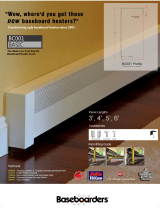
IO-510
2-way Cabinet
Indoor / Outdoor
Loudspeaker
Woofer / Tweeter: Poly woofer with butyl rubber surround
1" Mylar soft dome pivoting tweeters
Sealed, port-less design enclosure prevents bugs and moisture from
entering cabinet.
Versatile mounting options, includes standard type "U" bracket, and
mounting bosses on rear for optional double-swivel mounting brackets.
OWNER'S MANUAL
R E A R C O N F I G U R AT I O N S
S P E C I F I C AT I O N S
F E AT U R E S
5-1/4"
42 - 21K Hz
50 / 100 watts nom. / max.
90 dB 1 watt / 1 meter
8 ohms
Poly Woofer:
Frequency Response:
Power Handling:
Sensitivity:
Impedance:
Grille: Rust proof Perforated Aluminum Grille which is
epoxy painted for long life in high humidity and
salt air environments.
Available Colors:
White (IO-510W) & Black (IO-510B)
All cabinets, grilles & brackets are
paintable to match your decor.
Warranty: Lifetime Limited Warranty
Elegant cover
conceals and protects
connection terminals
I O - 5 1 0 B O X C O N T E N T S
(2) Cabinet Speakers
(2) Attached "U" brackets
(8) rubber feet
Owner's Manual
Warranty Card
Shown with
the included
U-Bracket
®
rear mounted view
with SE-DBLSVL
Swivel Bracket
(not included)

OWNER'S MANUAL
Follow the manufacturers instructions for the installation of the bracket.
To prepare the speaker for this type of bracket, remove the endcaps by pulling
the back end of them away from the enclosure. Loosen and remove the brass
thumb screws that hold the bracket to the speaker. Remove the bracket and
replace the thumbscrews. Tighten them securely with your fingers. Slip the
front edge of the endcaps into the available grooves and press the endcaps
back into place ensuring that they engage with the thumbscrews. The bracket
is attached to the back of the speaker
using ¼-20 screws or bolts. The length
of the hardware will be determined by
the bracket thickness but it will likely
be about 1/2” to 5/8” in length. It will
be necessary to remove the terminal
cover from the back of the speaker. To
do this, use your finger(s) to pull back
on the bottom of the cover at the relief
in the enclosure.
I n s t a l l a t i o n U s i n g O p t i o n a l Double Swivel Bracket
Remove the endcaps by pulling the back end of them away from the enclosure.
Remove the bracket from the speaker by loosening and removing the brass thumb
screws that hold the bracket to the speaker.
Screw the bracket to the mounting surface. Either set of holes may be used (slots
or keyholes). If the wire is coming through the wall then it can be passed through
the center-hole in the bracket if desired or practical.
Prepare the wire for termination by stripping back the insulation approximately
½” (13mm).
Remove the terminal cover from back of the speaker using your finger(s) to pull
back on the bottom of the cover at the relief in the enclosure.
Attach the speaker to the bracket making the thumb screws finger tight.
Rotate the speaker into position so the input terminals can be accessed.
Pass the wire through the cover and connect it to the input terminals, observing
polarity to ensure consistency.
Snap the terminal cover into place and ro-
tate the speaker in the desired direction.
Tighten the thumb screws. A screwdriver
may be used to ensure they are tight.
Re-install the endcaps.
I n s t a l l a t i o n U s i n g t h e I n c l u d e d U-Bracket (continued)
4)
5)
6)
7)
8)
9)
10)
11)
12)
13)
14)
I n s t a l l a t i o n U s i n g t h e I n c l u d e d U-Bracket
Determine the installation location of the speaker. Use care to ensure the struc-
ture has the ability to carry the weight of the speaker. We recommend that the
speaker be located where there is a stud or other support structure especially if the
speaker will be oriented horizontally. If attaching to sheetrock (gypsum board),
ensure that you use suitable hardware such as toggle anchors (not supplied).
Measure the hole-spacing on the bracket and transfer these
dimensions to the mounting surface.
Install the attachment hardware, drilling holes as necessary.
In most installations the bracket will need to be removed from the speaker
so that it can be tightened to the mounting surface without obstruction.
1)
2)
3)
/

